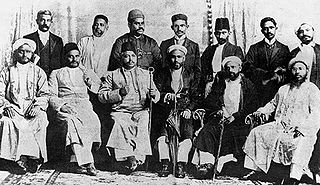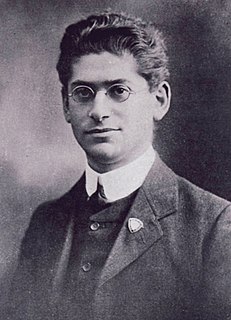Related Research Articles

Mohandas Karamchand Gandhi was an Indian lawyer, anti-colonial nationalist and political ethicist who employed nonviolent resistance to lead the successful campaign for India's independence from British rule, and to later inspire movements for civil rights and freedom across the world. The honorific Mahātmā, first applied to him in 1914 in South Africa, is now used throughout the world.

The Story of My Experiments with Truth is the autobiography of Mahatma Gandhi, covering his life from early childhood through to 1921. It was written in weekly installments and published in his journal Navjivan from 1925 to 1929. Its English translation also appeared in installments in his other journal Young India. It was initiated at the insistence of Swami Anand and other close co-workers of Gandhi, who encouraged him to explain the background of his public campaigns. In 1998, the book was designated as one of the "100 Best Spiritual Books of the 20th Century" by a committee of global spiritual and religious authorities.

Valangaiman Sankaranarayana Srinivasa Sastri, was an Indian politician, administrator, educator, orator and Indian independence activist. He was acclaimed for his oratory and command over the English language. Srinivasa Sastri was born to a poor temple priest in the village of Valangaiman near Kumbakonam, India. He completed his education at Kumbakonam and worked as a school teacher and later, headmaster in Triplicane, Madras. He entered politics in 1905 when he joined the Servants of India Society. Sastri served as a member of the Indian National Congress from 1908 to 1922, but later resigned in protest against the Non-Cooperation movement. Sastri was one of the founding members of the Indian Liberal Party. In his later days, he was strongly opposed to the partition of India.

The Natal Indian Congress (NIC) was an organisation that aimed to fight discrimination against Indians in South Africa.
Gangathura Mohambry Naicker was a medical doctor and a South African anti-apartheid activist of Indian Tamil descent.
Naidoo is a surname. It is an alternative spelling of Naidu. Notable people with the surname include:
Manonmoney Ama Naidoo OLS or Ama Naidoo was a South African anti-apartheid activist.
Thambi Naidoo was an early collaborator of Mahatma Gandhi. From 1906 to 1913, he helped Gandhi in the South African Indian communities as they struggled against pre Apartheid racial repression by the local white and the colonial British authorities in Durban.

Ela Gandhi, granddaughter of Mahatma Gandhi, is a South African peace activist and was a Member of Parliament in South Africa from 1994 to 2004, where she aligned with the African National Congress (ANC) party representing the Phoenix area of Inanda in the KwaZulu-Natal province. Her parliamentary committee assignments included the Welfare, and Public Enterprises committees as well as the ad hoc committee on Surrogate Motherhood. She was an alternate member of the Justice Committee and served on Theme Committee 5 on Judiciary and Legal Systems.

The Indian Opinion was a newspaper established by Indian lawyer and future anti-colonial activist M. K. Gandhi. The publication was an important tool for the political movement led by Gandhi and the Natal Indian Congress to fight racial discrimination and again civil rights for the Indian community in South Africa. It existed between 1904 and 1915.

The Gandhi cap is a white sidecap, pointed in front and back and having a wide band. It is made out of khadi. It takes its name after the Indian leader Mahatma Gandhi, who first popularised its use during the Indian independence movement. Worn commonly by Indian independence activists, it became a symbolic tradition for politicians and political activists to wear it in independent India.

Indian South Africans are South Africans who descend from indentured labourers and migrants who arrived from British India during the late 1800s and early 1900s. The majority live in and around the city of Durban, making it one of the largest "Indian" populated cities outside of India.

Dattatreya Balkrishna Kalelkar, popularly known as Kaka Kalelkar, was an Indian independence activist, social reformer, journalist and an eminent follower of the philosophy and methods of Mahatma Gandhi.

Enuga Sreenivasulu Reddy, also known as E. S. Reddy, was an Indian-born diplomat at the United Nations who led the anti-apartheid efforts at the UN's Special Committee Against Apartheid and its Centre Against Apartheid. He also served as director of the UN Trust Fund for South Africa and the Educational and Training Programme for Southern Africa. During his time in these roles, he campaigned for economic boycott of the then Government of South Africa, advancing anti-apartheid actions including a combination of economic and social measures. He also lobbied for the release of the imprisoned leader Nelson Mandela.
Amina Cachalia, OLB was a South African anti-Apartheid activist, women's rights activist, and politician. She was a longtime friend and ally of former President Nelson Mandela. Her late husband was political activist Yusuf Cachalia.
Jehangir Bomanji Petit was a noted nationalist, mill owner, philanthropist and one of Mahatma Gandhi's earliest supporters.
Ismail Ahmed Cachalia (1908-2003), popularly known as Moulvi, was a South African political activist and a leader of Transvaal Indian Congress and the African National Congress. He was one of the leaders of the Indian Passive Resistance Campaign of 1946 and the Defiance Campaign in 1952. The Government of India awarded the fourth highest Indian civilian honour of Padma Shri in 1977.
Rustomjee Jivanji Ghorkhodu, commonly known as Parsee Rustomjee, and by various orthographic variations including Parsi Rustomji and affectionately referred to as Kakaji, was an Indian-South African philanthropist and businessman, well known for his close mentorship, guidance and financial sponsorship of Mahatma Gandhi during his time in South Africa from 1893–1914.
Dr. Zainab Asvat was a South African anti-apartheid activist. Asvat was trained as a medical doctor, but was politically active most of her life.

Henry Salomon Leon Polak was a British-born lawyer, journalist and activist in South Africa who worked in collaboration with Mohandas Gandhi against racial discrimination. He served as an editor for the journal Indian Opinion and influenced by Theosophy, he believed in humanism and worked for the British Indian Association and several other causes.
References
Gerhart G.M and Karis T. (ed)(1977). From Protest to challenge: A documentary History of African Politics in South Africa: 1882–1964, Vol.4 Political Profiles 1882 ? 1964. Hoover Institution Pres: Stanford University